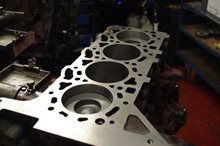David Eszenyi, Commercial Director at Ivor Searle, examines the benefits offered by remanufactured major units and the need to keep educating the market about the fundamental differences between a remanufactured engine and a reconditioned engine, plus associated components.

There’s no doubt that cost is the principal factor when it comes to selling the benefits of remanufactured engines and other major units. This is of course a primary driver for independent workshops operating in a highly price-sensitive market. Using Ivor Searle‘s product portfolio as an example, our remanufactured engines, cylinder heads, gearboxes and reman turbos cost up to 40% less than OE. Not only that, we offer garages a competitive advantage by providing superior engineered quality units without compromising on quality, warranty protection or customer service.
So it’s more economical to source a remanufactured engine or other major unit but quality and adherence to industry standards are key factors that I believe we need to keep promoting to distinguish ourselves from inferior reconditioned products in the market. The complex process of remanufacturing an engine back to OEM standard requires significant investment in skills and equipment, let alone technical expertise and rigorous inspection procedures.
All remanufactured Ivor Searle engines are built to exceed the BS AU257:2002 Code of Practice. This crucial standard sets out the difference between a high quality remanufactured engine to an inferior reconditioned unit. A remanufactured engine is one which has been returned to the manufacturer’s original specification, so it delivers performance and reliability equivalent to a brand new engine.
The standard fully details how petrol and diesel engines and components should be inspected and checked against OEM tolerances. BS AU257:2002 also dictates that key components, including piston assemblies, big and small end bearings, as well as bushes, gaskets, seals, timing chains and drive belts are completely renewed, while items such as tensioners and dampers are checked and replaced where necessary.
Important additional operations such as crack testing machined components or deburring reworked oilways are also required to ensure original performance is achieved with reliability. In addition to having all key clearances and tolerances inspected after assembly, the standard also demands that complete engines are checked for oil pressure and compression.
Thanks to this rigorous process, customers purchasing a remanufactured engine from Ivor Searle can be confident that they are investing in a unit that is built to a such a high standard. In contrast, a reconditioned engine has been stripped or disassembled and cleaned and may have had some damaged components replaced. Put simply, reconditioning is an entirely subjective process that offers little or no reassurance to the customer in terms of longevity, warranty protection or performance to OEM standards.
Compare this to the remanufacturing process which aims to return a product to at least its original specification and performance with a warranty that is equivalent or better than that of its brand-new equivalent. At Ivor Searle, all our engines have a 12-month, unlimited mileage guarantee and each has a unique serial number. Once shipped, we rarely see one back, which is testament to over 70 years of experience and superior technical expertise.
In terms of other products, Ivor Searle also applies the same quality focused ethos from engine remanufacturing when it comes to cylinder heads, gearboxes and turbochargers, all of which are remanufactured under a quality management system certified to ISO 9001:2015. Again, this approach enables us to ensure customers are provided with quality products remanufactured to a consistent standard at an attractive price.
Furthermore, we are also utilising our remanufacturing expertise to expand into the Diesel Particulate Filter (DPF) cleaning market, through the recent introduction of a fast-turnaround professional service that complements our remanufacturing business. Utilising state-of-the-art Flash Cleaning technology, the environmentally-friendly water-based process delivers as new levels of cleanliness by removing all soot and ash deposits, including PM10 particles, cerium oxide deposits and oil residues, from the DPF.
Finally, it’s also important to remember the ‘green’ aspect of remanufacturing and the contribution our industry makes to protecting the environment. Typically, a remanufactured engine from Ivor Searle will save 55kg in core metal with 85% of an engine’s components returned to OEM specification. Remanufacturing also uses around 85% less energy than manufacturing at the other end of the cycle and ultimately reduces the quantity of landfill and the associated energy needed for disposal. In many respects, it would be fair to say that engine remanufacturers are the unsung heroes of recycling.
Filed under: DPF cleaning, engine remanufacturing, Ivor Searle DPF, Ivor Searle gearbox, reconditioned engines, reman engines, reman turbos, remanufactured engines